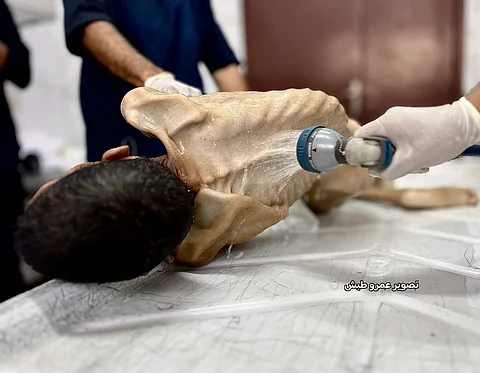

Israel’s marginal increase in aid allowances to Gaza has done little to alleviate the escalating humanitarian catastrophe, with UN officials and Palestinians decrying the ongoing bureaucratic stranglehold and militarized control over essential supplies.
Reports from Gaza paint a grim picture of widespread starvation, rising malnutrition, and deadly attacks on civilians seeking food, as Israel’s policies continue to obstruct meaningful relief efforts.
The situation has sparked international outrage and calls for urgent action.
Olga Cherevko, a UN Office for the Coordination of Humanitarian Affairs (OCHA) staff member in Gaza, told Al Jazeera from Deir el-Balah that the slight uptick in aid entering the enclave is “not nearly enough to even scratch the surface to meet the people’s needs here on the ground.”
She highlighted Israel’s vast bureaucratic restrictions, which require UN coordination for every step of aid delivery, often resulting in extensive delays.
“People are continuing to starve, malnutrition rates continue to go up, people are risking their lives to get food, and there’s no change substantially and operationally, really,” Cherevko said.
UNICEF’s deputy executive director, Ted Chaiban, confirmed that Gaza has now crossed the famine threshold, with acute malnutrition exceeding 16.5 percent and one in three people going days without food.
Despite 1,500 UNICEF aid trucks waiting at Gaza’s borders, only 33 entered recently — a fraction of what is needed.
Chaiban emphasized that Israel’s restrictions prevent sufficient aid flow, leaving over 320,000 children at risk.
Gaza’s Health Ministry reported 162 deaths from starvation, including 92 children, underscoring the lethal impact of these delays.
UNRWA chief Philippe Lazzarini criticized the shift to costly airdrops, which he said are “100 times more costly than trucks while carrying just half the assistance.”
With 6,000 UNRWA trucks blocked at Gaza’s borders, Lazzarini argued, “If there is political will to allow airdrops – which are highly costly, insufficient & inefficient, there should be similar political will to open the road crossings.”
He stressed that only a UN-coordinated response, with UNRWA as its backbone, has proven effective in delivering aid safely and with dignity.
The Gaza Humanitarian Foundation (GHF), backed by the US and Israel, has come under fire from Palestinians as a “symbol of control and manipulation.”
Reporting from Deir el-Balah, Al Jazeera’s Tareq Abu Azzoum noted that accessing food through GHF sites has become dangerous and humiliating, with 1,373 Palestinians killed while seeking aid since May, mostly by Israeli forces.
The UN human rights office reported 859 deaths near GHF sites and 514 along food convoy routes, highlighting the militarization of aid distribution.
Israeli soldiers’ use of silenced weapons to target aid seekers in northern Gaza further compounds fears of deliberate suppression.
Prominent voices, including celebrated Israeli writer David Grossman, have labeled Israel’s actions in Gaza as “genocide.”
In an interview with La Repubblica, Grossman said:
For many years, I refused to use that term: ‘genocide’... But now, after the images I have seen and after talking to people who were there, I can’t help using it... This word is an avalanche: once you say it, it just gets bigger, like an avalanche. And it adds even more destruction and suffering.
Over 700 EU staff members urged leaders to pressure Israel to open all land crossings and permit humanitarian ships, proposing sanctions and diplomatic suspensions to enforce compliance with international law.
The crisis has left families like Nasma Ayad’s in despair, as her daughter Jana, weighing just 11kg, battles severe malnutrition.
“I feel I’m slowly losing my daughter, day after day – everything she’s suffering from is multiplying,” Ayad said.
With 65 Palestinians killed in Israeli attacks on Friday, 36 while seeking aid, and over 270 injured, the World Health Organization demanded 600 trucks enter Gaza daily to end the “man-made disaster.”
As Israel’s policies continue to choke Gaza’s lifeline, the international community faces mounting pressure to act decisively.